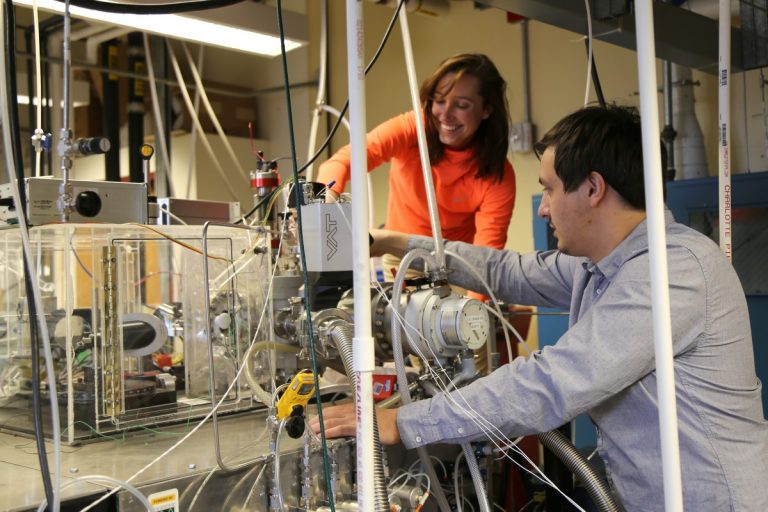
Chemical and biological engineering is absolutely central to our everyday lives. So ingrained is it in everything around us that you may not even realise the myriad of applications that surround us. Without them, many of our modern-day luxuries and lifestyles would not be possible. From your phone battery to your drinking water, the crops that feed us to healthcare; chemical and biological engineers are helping to diminish starvation, disease and poverty, improving the standard of living for people around the globe.
To find the best solutions to challenging global issues, the field must continue to question the existing status quo, pushing through the boundaries of current knowledge and understanding.
Universities are leading the charge in this movement. While research and expertise from these disciplines are steeped in our global society, it will be the young chemical and biological engineers of higher education who will stand at the forefront of the industry’s future development.

Shutterstock
This makes graduates highly employable across a wide range of sectors, including energy, healthcare, food, water, and more. Chemical engineering is one of the best-paying professions in the US, with the median starting salaries for qualified engineers listed as around $94,000, while the business of biomedical engineering is expected to grow much faster than the nation’s average rate, according to the US Department of Labor.
The work of both the chemical and biological engineers in society is so important that members of this field stand strong in the knowledge that what they do each day makes a real difference in the world, both now and long into the future.
But there is still so much of the biological and chemical engineering landscape that remains uncharted. Many areas exist that are open for exploration and innovation – could you soon become an industry pioneer?
Here are 5 Engineering Schools that are helping to define the frontiers of knowledge…
COLLEGE OF APPLIED SCIENCE AND ENGINEERING, COLORADO SCHOOL OF MINES (CSM)
Chemical and Biological Engineering (CBE) is one of four departments and two interdisciplinary programs housed within the College of Applied Science and Engineering at the Colorado School of Mines. This unique department combines one of the nation’s largest programs in a small school environment. CBE is among the largest producers of Chemical Engineering degrees in the US, but placed within a university of just 5000 total students. This enables high participation in extracurricular activities ranging from the arts to athletics to student government. Nestled at the foot of the Rocky Mountains 15 miles from downtown Denver, the location offers unparalleled access to both outdoor recreation and urban amenities.

Image courtesy of Colorado School of Mines
The Department’s undergraduate BS degree in Chemical Engineering offers flexibility for students to tailor their curriculum to meet individual interests, including specialty tracks in Biological Engineering and Process Engineering. With a strong emphasis on active learning, these courses minimize lectures and maximize student involvement. One example is its innovative Studio Biology facility in which students design and perform experiments that explore biological systems. CBE graduates experience high placement in high paying professions, providing Colorado School of Mines with one of the highest lifetime return on investments for a public US university.
At the graduate level, the department offers both thesis and non-thesis Masters degrees in addition to the PhD degree. These programs offer advanced training in a diverse array of research areas that include hydrates, catalysis, biomedical devices, polymers, fuel cells, and renewable energy. The institution provides some of the best research facilities in the country, including high-quality laboratories, powerful on-campus computational facilities and specialized labs.
The department benefits from strong ties with the National Renewable Energy Laboratory, located just 10-minutes from campus, as well as other regional federal laboratories and research hospitals. With over US$7 million in annual research awards, there’s a host of opportunities. The modest size means that students receive personal attention from leaders in the field, working closely with faculty on meaningful research on pressing challenges.
COLLEGE OF ENGINEERING, PURDUE UNIVERSITY
Nestled in the heart of Indiana, this historic University provides a refreshingly modern take on chemical engineering. The institution promises that “engineering is a ride of a lifetime”, and where better to kick-off the journey than a College set on finding solutions to some of the world’s most pressing issues.
At one of the biggest chemical engineering faculties in America, you’ll work side-by-side with leading experts who are dedicated to ensuring your success, as well as the integrity and relevance of the research they conduct. The School of Chemical Engineering is committed to performing field-defining research that is highly-regarded worldwide for its impact and quality.
The range of research topics pursued at Purdue is incredibly broad, with award-winning scholars working on topics like biomaterials, protein engineering, transport of nanoparticles in cancer cells, and catalysis and reaction engineering, just to name a few.
You will also have the Bindley Bioscience Center at your disposal, a tool that initiates and facilitates multi-investigator, multi-disciplinary research that blends life science with engineering study.
COLLEGE OF ENGINEERING, TEXAS A&M UNIVERSITY
Texas A & M University is home to one of the largest and most respected biological and agricultural engineering departments in the country, as ranked by US News and World Report.

Image courtesy of Texas A&M University
The Artie McFerrin Department of Chemical Engineering is also one of the largest, fully-accredited programs in the US.
Besides classroom instruction, many outlets exist for real-world experience through research opportunities, internships, and co-op education.
The staff at A&M are engaged in a wide breadth of research ranging from highly-applied research in areas of biomass utilization, process safety, and hydrocarbon processing, to fundamental research in nanotechnology, life sciences, and molecular simulation.
The ultimate goal for Texas A&M is to positively impact society through the provision of new knowledge. In doing so, the institution also urges students to develop into independent researchers who, in their careers, continue to advance the forefront of science and technology.
DEPARTMENT OF ENERGY AND MINERAL ENGINEERING, PENN STATE UNIVERSITY
Students at Penn State’s Department of Energy and Mineral Engineering (EME) have access to world-class facilities and laboratories, ensuring all work they undertake is the best it can possibly be.
At Penn State, research enterprise develops and nurtures new researchers and future industry leaders, while current focus remains on an area of study that will make waves in the world of the future.
By exploring effective production, conversion, utilization, and management of energy and mineral resources, Penn State is forging the way in finding solutions to real-world problems, not just in the engineering world but the planet in general – such as alternate transportation fuels, advanced pollution control concepts, and new catalysts for chemicals production.
EME students have access to excellent experimental and computational laboratories, including state-of-the-art analytical facilities at the EMS Energy Institute and the Materials Research Institute.

Shutterstock
HERBERT WERTHEIM COLLEGE OF ENGINEERING, UNIVERSITY OF FLORIDA (UF)
The University of Florida’s Department of Agricultural & Biological Engineering links engineering with life sciences to produce food, feed, fuel, fibre and other products from renewable bio-resources.
Given that Florida’s agricultural industry is one of the nation’s largest and most diverse, UF works towards continued prosperity as the population swells and natural resources become increasingly limited. In doing so, the College takes a broad and interdisciplinary approach to research.
The facilities and range of experimental environments offered here are enough to keep any student engaged throughout their studies. These range from ultrahigh vacuum to extreme static pressures, from liquid helium to refractory melting temperatures.
At UF Engineering, students recognise where their skills can be used after graduation, with the Engineering Innovation Institute fostering a culture of innovation that aims to prepare students and technologies for the real-world marketplace. UF feels entrepreneurship should not be restricted to those coming from business-oriented fields so this facility serves as a bridge between classroom learning and the profession.
*Some of the institutions featured in this article are commercial partners of Study International
Liked this? Then you’ll love these…
Turn ideas into a reality: 5 leading universities for Mechanical Engineering
4 US providers of Petroleum Engineering education that open doors to career success







